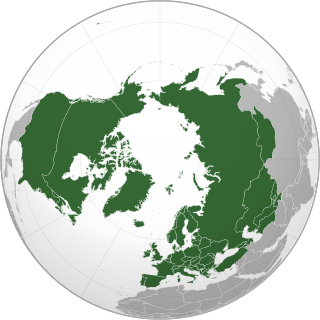
The Politics of Azerbaijan takes place in a framework of a semi-presidential republic, with the President of Azerbaijan as the head of state, and the Prime Minister of Azerbaijan as head of government. Executive power is exercised by the president and the government. Legislative power is vested in both the government and parliament. The Judiciary is nominally independent of the executive and the legislature. The state system of Azerbaijan defines the Constitution of the Republic of Azerbaijan. According to the constitution, Azerbaijan is a democratic, secular, unitary republic.

Robert Kocharyan is an Armenian politician who served as the second President of Armenia between 1998 and 2008. He was previously President of Nagorno-Karabakh from 1994 to 1997 and Prime Minister of Armenia from 1997 to 1998. He was arrested on December 7, 2018.

Heydar Alirza oglu Aliyev was an Azerbaijani politician who served as the third President of Azerbaijan from October 1993 to October 2003. As national president he held constitutional powers, but his influence on Azerbaijani politics had begun years earlier. As a young man he had joined the Azerbaijan SSR People's Commissariat for State Security (NKGB) and quickly rose to the rank of Major-General.
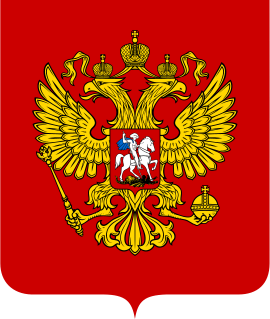
On the federal level, Russia elects a president as head of state and a legislature, one of the two chambers of the Federal Assembly. The president is elected for, at most, two consecutive six-year terms by the people. The Federal Assembly has two chambers. The State Duma has 450 members, elected for five-year terms, using a system of proportional representation, where parties gain a percentage of seats equal to the percentage of national votes they gained, with a 7% threshold required to gain any seats in the Duma. The Federation Council is not directly elected; each of the 85 federal subjects of Russia sends 2 delegates to the Federal Council, for a total of 170 members.

Presidential elections were held in Azerbaijan on 15 October 2003. As expected, Ilham Aliyev, son of the outgoing president, Heydar Aliyev, was easily elected in an election which international observers held not to be free or fair.
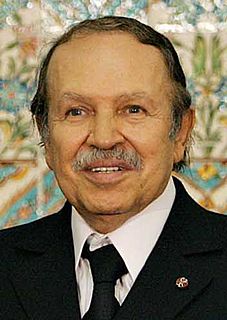
Presidential elections were held in Algeria on 8 April 2004. Incumbent President Abdelaziz Bouteflika was re-elected with 85% of the vote.

The 2008 Russian presidential election was held on 2 March 2008, and resulted in the election of Dmitry Medvedev as the third President of Russia. Medvedev was elected for a 4-year term, whose candidacy was supported by incumbent President Vladimir Putin and five political parties, received 71% of the vote, and defeated candidates from the Communist Party of the Russian Federation, the Liberal Democratic Party of Russia and the Democratic Party of Russia.

The Tofiq Bahramov Republican Stadium is a multi-purpose stadium in Baku, Azerbaijan. It is currently used mostly for football matches. It serves as the home ground for the Azerbaijan national football team and holds 31,200 seats making it the second largest stadium in the country. The stadium is also used by the Azerbaijan Premier League clubs in the final rounds of European competitions.
The OSCE Minsk Group was created in 1992 by the Conference on Security and Cooperation in Europe to encourage a peaceful, negotiated resolution to the conflict between Azerbaijan and Armenia over Nagorno-Karabakh.

The Ukrainian presidential election of 2010 was Ukraine's fifth presidential election since declaring independence from the Soviet Union in 1991. The first round was held on January 17, 2010. The run-off between Prime Minister Yulia Tymoshenko and opposition leader Viktor Yanukovych followed on February 7, 2010.

The 2008 Mardakert skirmishes began on March 4 after the 2008 Armenian election protests. It involved the heaviest fighting between ethnic Armenian and Azerbaijani forces over the disputed region of Nagorno-Karabakh since the 1994 ceasefire after the Nagorno-Karabakh War.
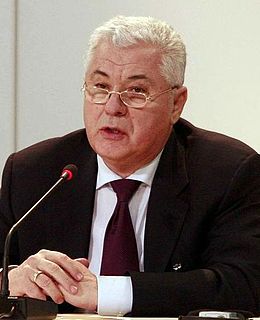
Parliamentary elections were held in Moldova on 5 April 2009. The Party of Communists of the Republic of Moldova (PCRM) won a majority of seats for the third consecutive occasion. Turnout was 59%, exceeding the 50% necessary for the election to be valid.
A constitutional referendum was held in Azerbaijan on 18 March 2009. It consisted of 29 measures voted on separately; the most controversial were a measure to abolish presidential term limits and a measure to greatly restrict press freedom. The measures passed, with approval of measures between 87.14% and 91.76%, disapproval between 4.59% and 7.24% and invalid votes between 3.64% and 5.70%; turnout was 71.08%.
Parliamentary elections were held in Azerbaijan on 7 November 2010.

Presidential elections were held in Azerbaijan on 9 October 2013. The result was a victory for incumbent President Ilham Aliyev, who received 84.5% of the vote, whilst leading opposition candidate Jamil Hasanli finished second with 5.5% of the vote.
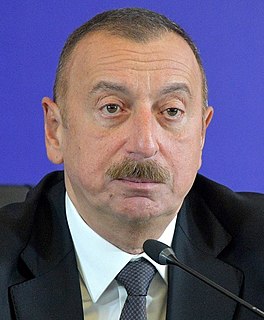
Presidential elections were held in Azerbaijan on Wednesday, 11 April 2018. Eight candidates ran for the presidency. Incumbent President Ilham Aliyev was re-elected president for a seven-year term. The election was the first since the 2016 Constitutional Referendum, which extended the presidential term from five to seven years.
Caviar diplomacy is the lobbying strategy of Azerbaijan, consisting of costly invitations of foreign politicians and employees of international organizations to Azerbaijan at the expense of the host country. Caviar Diplomacy also includes expensive gifts presented as “a tribute to the Eastern tradition.”
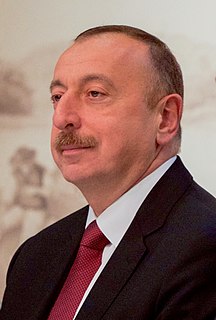
Ilham Aliyev is the 4th President of the Republic of Azerbaijan. His presidency began in 2003, after what he was twice (2008,2013) elected to the post of President of the country.







